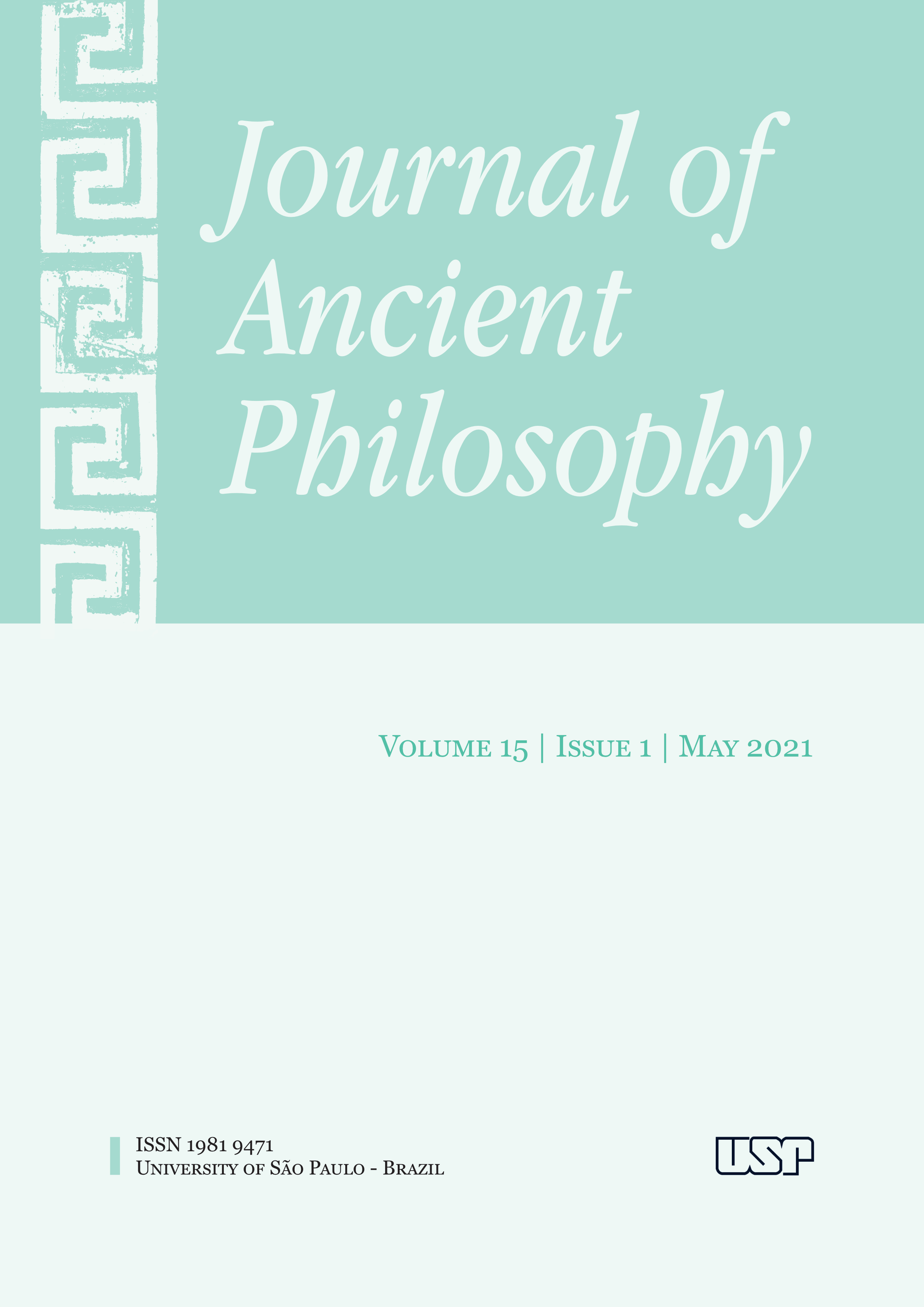Futuros contingentes: história de uma outra batalha
DOI:
https://doi.org/10.11606/issn.1981-9471.v15i1p207-260Palavras-chave:
De interpretatione, batalha naval, futuros contingentesResumo
The problem of future contingents is examined here through the vantage point of another controversy, the one over which answer Aristotle should be credited with. Two answers are attributed to Aristotle. According to the first one, which is nowadays often referred to as the traditional answer, Aristotle argued that, to prevent determinism as the valid conclusion of the argument presented at the beginning of De interpretation 9, one has to deny the universal validity of the principle of bivalence; according to the other, Aristotle accepted the validity of the principle of bivalence, but averted the conclusion of determinism by introducing the notion of indefinite verum. Both answers are examined with a view to shedding some light on this chapter that has kindled so much discussion.
Downloads
Referências
Ackrill, J. (1963) Aristotle’s Categories and De Interpretatione. Clarendon Press: Oxford.
Ademollo, F. (2010) The Principle of Bivalence in De Interpretatione 4. Oxford Studies in Ancient Philosophy 38: 97-113.
Anscombe (1981) From Parmenides to Wittgenstein: the collected papers of G.E.M. Anscombe. Blackwell: Oxford.
Barbosa Filho, B. (2013) Tempo, Verdade e Ação: Estudos de Lógica e Ontologia. Editora Paulus: São Paulo.
Blank, D. e Kretzmann, N. (1998) Ammonius: On Aristotle On Interpretation 9 with Boethius: On Aristotle On Interpretation 9. Bloomsbury: London.
Boys-Stones, G. (2018) Platonist Philosophy 80 BC to AD 250. Cambridge University Press: Cambridge.
Crivelli, P. (2004) Aristotle on Truth. Oxford University Press: Oxford.
Fine, G. (1984) Truth and Necessity in De Interpretatione 9, History of Philosophy Quarterly 1: 23-47.
Frede, D. (1970) Aristoteles und die ‘Seeschlacht’: Das Problem der Contingentia Futura in De Interpretatione 9. Vandenhoeck & Ruprecht: Göttingen.
Frede, D. (1972) Omne quod est quando est necesse est esse, Archiv für Geschichte der Philosophie 54: 153-67.
Frede, D. (1985) The Sea-Battle Reconsidered: a Defence of the Traditional Interpretation. Oxford Studies in Ancient Philosophy 3: 31-87.
Gaskin, R. (1995) The Sea Battle and the Master Argument: Aristotle and Diodorus Cronus on the Metaphysics of the Future. De Gruyter: Berlin.
Gaskin, R. (2000) Simplicius: On Aristotle’s Categories 9-15. Bloomsbury: London.
Giannantoni, G. (1981) Il kurieuôn logos di Diodoro Crono, Elenchos 2: 239-272.
Gourinat, J.-B. (2006) L’histoire du principe de bivalence selon Lukasiewicz, in R. Pouivet e M. Rebuschi (eds.), Philosophie en Pologne 1918-1939, Vrin, Paris (2006 : 37-66).
Griffin, M. (2015) Aristotle’s Categories in the Early Roman Empire. Oxford University Press: Oxford.
Hintikka, J. (1973) Time and Necessity: Studies in Aristotle’s Theory of Modality. Clarendon Press: Oxford.
Hintikka, J.; Knuuttila, S. e Remes, U. (1977) Aristotle on Modality and Determinism. Acta Philosophica Fennica 29 1.
Iacona, A. (2007) Future Contingents and Aristotle’s Fantasy, Crítica 39 117: 45-60.
Kirwan, C. (1986) Aristotle on the Necessity of the Present, Oxford Studies in Ancient Philosophy 4: 167-87.
Kneale, W. & M. (1991) O Desenvolvimento da Lógica. Fundação Calouste Gulbenkian: Lisboa.
Koch, I. (2019) La Causalité Humaine – sur le De Fato d’Alexandre d’Aphrodise. Classiques Garnier: Paris.
Kretzmann, N. (1998) Boethius and the truth about tomorrow’s sea battle, in D. Blank e N. Kretzmann (1998: 2452).
Łukasiewicz, J. (1957) Aristotle’s Syllogistic from the Standpoint of Modern Formal Logic. 2nd. ed. Clarendon Press: Oxford.
Łukasiewicz, J. (1967) Philosophical Remarks on Many-Valued Systems of Propositional Logic, in McCall (1967: 40-65).
Łukasiewicz, J. (1970) Selected Works, ed. By L. Borkowski. North-Holland Publishing Company: Amsterdam.
McCall, S. (ed.) Polish Logic 1920-139. Clarendon Press: Oxford.
Modrak, D. (2001) Aristotle’s Theory of Language and Meaning. Cambridge University Press: Cambridge.
Moraux, P. (1984) Der Aristotelismus bei den Griechen vol. II. De Gruter: Berlin.
Pouivet, R. e Rebuschi, M. (eds.) Philosophie en Pologne 1918-1939, Vrin: Paris.
Prawitz, D. (2009) Logical Determinism and the Principle of Bivalence, in Stoutland (2009: 111-135).
Quine, W. (1966) The Ways of Paradox and Other Essays, Random House: New York (1976, 2nd. ed.: Harvard University Press: Harvard).
Ross, D. (1924) Aristotle’s Metaphysics, Clarendon Press: Oxford.
Santos, R. (2016) Categorias – Da Interpretação. Imprensa Nacional: Lisboa.
Sharples, R (1982) An Ancient Dialogue on Possibility: Alexander of Aphrodisias Quaestio I 4, Archiv für Geschichte der Philosioohie 64: 23-38.
Sharples, R. (1983) Alexander of Aphrodisias – On Fate. Duckworth: London.
Sharples, R. (1992). Alexander of Aphrodisias – Quaestiones 1.1-2.15. Duckworth: London.
Sorabji, R. (1980) Necessity, Cause and Blame: Perspectives on Aristotle’s Theory. Cornell University Press: Ithaca.
Sorabji, R. (1998) The three deterministic arguments opposed by Ammonius, in D. Blank e N. Kretzmann (1998: 3-15).
Sorabji, R. (1998) Boethius, Ammonius and their different Greek backgrounds, in D. Blank e N. Kretzmann (1998: 16-23).
Stoutland, F. (2009) Philosophical Probings: essays on von Wright’s later work. Automatic Press: Kөbenhavn.
Weidemann, H. (2014) Aristoteles De Interpretatione. De Gruyter: Berlin.
Whitaker, C. (1996) Aristotle’s De Interpretatione: Contradiction and Dialectic. Clarendon Press: Oxford.
Wright, G. von (1984) Truth, Knowledge and Modality. Blackwell: Oxford.
Zimmermann, F. W. (1981) Al-Farabi’s Commentary and Short Treatise on Aristotle’s De Interpretatione. Oxford University Press: Oxford.
Downloads
Publicado
Edição
Seção
Licença

Este trabalho está licenciado sob uma licença Creative Commons Attribution 4.0 International License.
Autores que publicam nesta revista concordam com os seguintes termos:- Autores mantém os direitos autorais e concedem à revista o direito de primeira publicação, com o trabalho simultaneamente licenciado sob a Licença Creative Commons Attribution (CC 4.0) que permite o compartilhamento do trabalho com reconhecimento da autoria e publicação inicial nesta revista.
- Autores têm autorização para assumir contratos adicionais separadamente, para distribuição não-exclusiva da versão do trabalho publicada nesta revista (ex.: publicar em repositório institucional ou como capítulo de livro), com reconhecimento de autoria e publicação inicial nesta revista.
- Autores têm permissão e são estimulados a publicar e distribuir seu trabalho online (ex.: em repositórios institucionais ou na sua página pessoal) a qualquer ponto antes ou durante o processo editorial, já que isso pode gerar alterações produtivas, bem como aumentar o impacto e a citação do trabalho publicado (Veja O Efeito do Acesso Livre).


